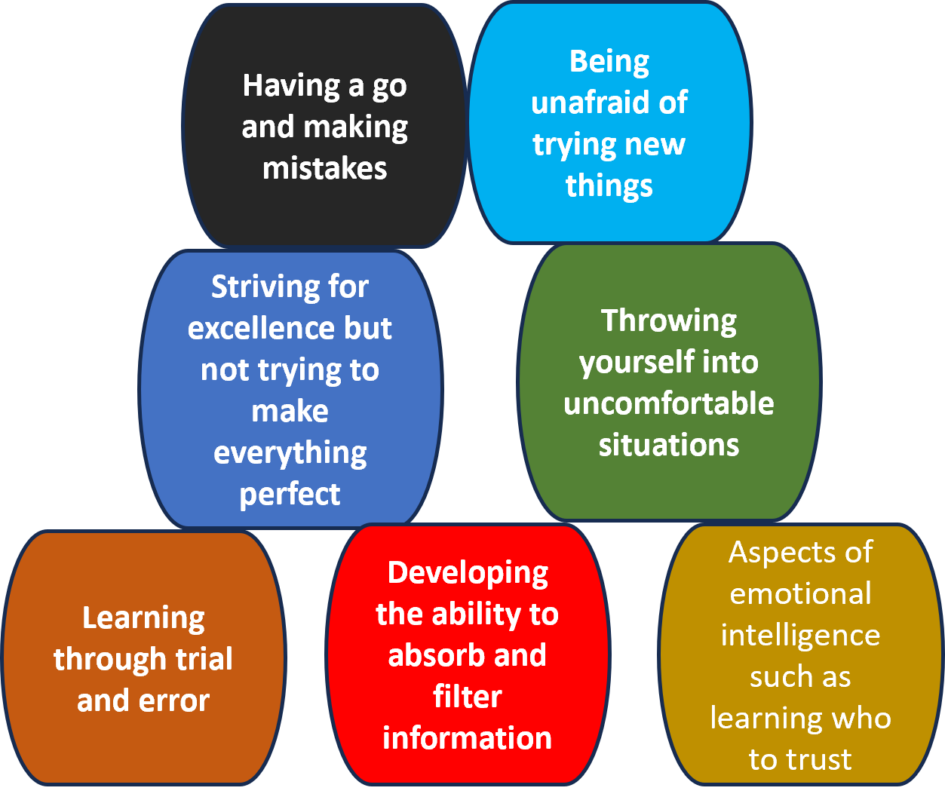Scaffolding Character: The ‘Finnishing’ Touch To Unleash Hidden Potential

In this article, Neil delves into Adam Grant’s ‘Hidden Potential’, exploring its insights on character education and skill development. Grant challenges the societal emphasis on talent, advocating for a transformative focus on character skills. The discussion spans early development, the importance of scaffolding, and draws parallels with the innovative Finnish education system, providing a paradigm shift applicable to all ages.
The Gift Of Grant
I have finally, during these cold, dark winter nights, got around to reading some of the books I received as Christmas presents. Top of the list was Adam Grant’s ‘Hidden Potential’.

Grant is a renowned professor, a thought leader in personal and professional development and the book was highly recommended, so I was feeling positive about learning something interesting as I turned to the first page….and I was right to feel that way! The book is informative, stimulating and the conclusions, based on his research, relate to the world I operate in; that of character education and skill development for young people. And thankfully, the conclusions confirm as good practice what we have been striving to achieve over a number of years at Kloodle.
Challenging The Social Narrative
Grant runs through a journey with well-supported arguments, backed by plausible case-studies and research, in which he challenges the pervasive belief in the primacy of talent, emphasising the transformative power of character skills and, ultimately, painting a compelling picture of a world where potential can be recognised, nurtured, and celebrated at every stage of life.
The book starts by criticising preconceived notions about success and society’s obsession with celebrating ‘talent’ and the ‘gifted’. Conventional belief promotes ideas that success is reserved for those with inherent advantages and that puts doubt in the minds of the rest of us. However, admiring people who start out with innate advantages leads us to overlook the distance we ourselves can travel if we put our minds to it. We underestimate our potential – the range of skills that we can learn and how good we can become. And when opportunity doesn’t knock, there are ways to build a door.
Grant urges readers to recognise their potential for growth and skills’ development and offers a framework for raising aspirations and exceeding expectations.
Skills of Character
The core message revolves around the significance of character skills and that progress is less about innate genius and more about the character capabilities one develops. It’s very much along the lines of the Growth Mindset and you can ‘grow’ from an early age by adopting a ‘mindset’ of:

These are presented as essential character skills that can be cultivated over time, labelled in silos as:

The benefit of developing character skills is that you don’t have to be the smartest person in the room to flourish. People with strong character traits are the ones who strive to make themselves and others smarter, employing problem solving and critical thinking.
Throughout the book, Grant supports his arguments with compelling research and studies. The surprising findings, such as the impact of character skills on the success of African entrepreneurs, challenge conventional wisdom and add depth to the book’s overarching message.
Early Development of Character
A significant proposition is the early development of character skills, with kindergarten identified as an ideal starting point. It is important to teach children to embrace discomfort, to seek challenges, and be comfortable with imperfectionism from an early age as this lays the foundation for a mindset of continuous growth.
Backed up by research by Harvard economist Raj Chetty, Grant believes that these character skills, learned way back in kindergarten, play a pivotal role in determining success, and are more predictive of future success than cognitive abilities.
The Importance of Scaffolding
Scaffolding has a critical role in building character and boosting performance. Drawing parallels with the classic ‘marshmallow test of willpower’, individuals set up and/or search out temporary structures to support their efforts, reducing the reliance on raw character skills. Delving into the realm of motivation, the concept of ‘deliberate play’ is crucial. This approach involves making learning or practice fun in itself, as opposed to merely adding features to trick individuals into enjoying it. Grant urges that you should be proactive and not hold yourself to a fixed wrote routine, turning practice into play so that you can enjoy skill-building challenges like learning to play music by competing against yourself. He cites some real-world examples, such as the experiment of infusing deliberate play into work with health-care workers, delivering the transformative impact reduced burnout.
The Kloodle software has been designed to scaffold skills and character development of young people through an ‘evidence-based’ programme or scheme which has been proven to produce positive benefits. A key aspect of scaffolding is to obtain support from people around you; in this case it can be teachers, mentors or coaches, who provide essential support, observations and feedback through the Kloodle platform, assisting personal growth. Seeking support also extends into adulthood.
Systems of Opportunity
Grant advocates for the creation of ‘systems of opportunity’ that go beyond traditional notions of talent. Talent is evenly distributed, but opportunity is not. He explores how recognising and building systems that create opportunities for a broader range of individuals can lead to a more inclusive and successful society. In this way, Kloodle is a system which has been designed to help young people build their skills and connect with potential employers.
Probably the greatest system of opportunity would be to design schools to bring out the best in young people and an example is….
…The Finnish Education System
A fascinating part of the book is a section on the Finland’s education system, which stands in stark contrast to most others in fostering a culture of opportunity and prioritising educational equity for all students. The system operates on the belief that intelligence manifests itself in diverse forms, asserting that every child possesses the potential for excellence. The cornerstone of this approach is providing equal opportunities for success, challenging the notion that achievement is exclusive to the talented and gifted. The Finnish model emphasises the provision of exceptional teachers and personalised growth plans for every student, ensuring that no-one is left behind. Unlike conventional practices, Finland rarely resorts to holding students back or repeating grades, opting instead for early interventions such as individual tutoring and additional support.
The reforms that transformed Finland’s education system began way back in the 1970s with the goal of professionalising “education as an instrument for nation-building”, according to education expert Samuel Abrams.

One key building block was the calibre of teachers. Teachers are required to hold master’s degrees from top universities, attracting highly motivated candidates. Educators undergo advanced training in global evidence-based practices and receive highly competitive salaries. The cultural shift towards valuing teaching as a respected profession took time, involving changes in policies and generational shifts in a collaborative effort to define an ideal educational culture.
Teachers in Finland enjoy a significant degree of autonomy, not constrained by teaching to standardised tests, and are trusted professionals expected to stay informed about the latest research. The focus is on creating high-performing schools where all students exceed expectations, driven by the fundamental assumption that education should be tailored to individuals.
Finland’s commitment to personalised learning is evident in various practices. For example, ‘looping’, where students have the same teacher throughout multiple years, is common, fostering strong teacher-student relationships. Thirty percent of Finnish students receive extra assistance through early intervention.
“The Work Of The Child Is To Play”
Policymakers in the Finnish government adopt the maxim “The work of a child is to play” and believe that play fosters a love of learning, which ultimately builds better cognitive skills and better character skills. There’s even evidence that shows that students who enjoy school at age 6 go on to earn higher standardised test scores at 16 even after controlling for intelligence and social economic status.
As a result, Finnish kindergartens prioritise play over formal academics. Individualised learning plans are developed at this stage, emphasising play as a crucial component of early education. Lessons are routinely capped at 45 minutes, followed by a 15-minute break, aligning with research that supports the benefits of play in cognitive and character skills’ development. This emphasis on ‘joyful learning’ contributes to Finland’s educational success and challenges conventional notions about the early academic preparation of students.
Overall, Finland’s inspirational and aspirational education system serves as a global model for its commitment to inclusivity, teacher professionalism, and a child-centric approach to learning.
A Paradigm Shift
What Grant is propounding regarding character development is advantageous to all of us, whether a child or adult. The mindsets create a framework to support how we can all progress, at any age and whatever profession or vocation we are employed in, by regularly and consistently contemplating how to develop character skills. I believe the framework helps children to record and think through the benefits of developing character skills by reflecting on that via Kloodle. I also believe adults’ character traits and mental health would improve from a similar process.
The Finnish education system is not a theoretical ideal, but a working model which other governments could and should aim to follow. The paradigm shift that Grant proposes is exactly the mission which we are committed to at Kloodle. We see the Kloodle digital platform as a ‘system of opportunity’ through which young people, from all backgrounds, companies and societies can develop and tap into their hidden potential – in Grant’s words, “we can’t afford to waste a brain.” The tools available in the system act as a ‘scaffold’ to help young people to build their character, skills and motivation which are most useful later in life, for example, when connecting with employment opportunities.
Such a process is endorsed by the tennis legend Serena Williams, who knows a thing or two about talent and character; she declares Grant’s book to be a game-changer capable of reshaping perspectives on improvement and success: “I wish I could go back in time and gift it to my younger self. It would’ve helped me find a more joyful path to progress.”
By Neil Wolstenholme, Chairman of Kloodle
FE News on the go
Welcome to FE News on the Go, the podcast that delivers exclusive articles from the world of further education straight to your ears.
We are experimenting with Artificial Intelligence to make our exclusive articles even more accessible while also automating the process for our team of project managers.
In each episode, our thought leaders and sector influencers will delve into the most pressing issues facing the FE.











Responses